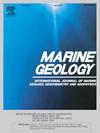探索西南大西洋格兰德河隆起的水下床形及其与水动力的关系
IF 2.6
3区 地球科学
Q2 GEOSCIENCES, MULTIDISCIPLINARY
引用次数: 0
摘要
本研究调查了格兰德河隆起(RGR)地区水动力、沉积物动力学和地形之间的相互作用。研究探讨了在五个不同区域发现的海床地貌,将其形成归因于未固结碳酸盐基质与底流(尤其是月半周期的主要成分 M2 潮汐流)之间的相互作用。床形是由 M2 潮汐流和当地地形相互作用形成的,底部平均流也对特定区域有所影响。一般来说,海床形态被归类为水下沙丘/潮滩。在与水流-地形相互作用相关的底部流速变化的驱动下,区域研究区内的环境分区划分了沉积区和非沉积区。水深测量数据显示,床形存在于较浅、水流能量较低的区域,而铁锰结壳则位于较深、水流能量较高的区域。这些数据表明,碳酸盐沉积物要么被运离结壳区域,要么被重新移动,导致在有床形的区域堆积。铁锰结壳区域的流速能够造成沉积物绕流,从而导致一些区域没有发生沉积。此外,这些流速超过了铁锰结壳沉淀的最佳流速条件,可能正在侵蚀先前形成的铁锰结壳。这些发现意味着铁锰结壳在一定程度上位于水下沙丘之下。这项研究凸显了洋流与 RGR 基底及其形态相互作用的复杂性,强调了在分析这些特征时当地流体力学和地形的重要性。本文章由计算机程序翻译,如有差异,请以英文原文为准。
Exploring subaqueous bedforms and its relation to hydrodynamics in the Rio Grande Rise, Southwestern Atlantic
This study investigates the interplay between hydrodynamics, sediment dynamics, and topography in the Rio Grande Rise (RGR) area. It addresses bedforms found in five different regions, attributing their formation to the interaction between unconsolidated carbonatic substrate and bottom currents, particularly the M2 tidal flow, the primary lunar semidiurnal constituent. The bedforms are shaped by the interplay of the M2 tidal current and local topography, with the bottom mean flow also contributing to specific areas. Generally, bedforms are classified as subaqueous dunes/tidal banks. The environmental sectorization within the RGR, driven by variations in bottom velocities related to flow-topography interaction, delineates deposition and non-deposition areas. Bathymetric data reveal that bedforms are present in shallower, lower-flow energy zones, whereas Fe![]() Mn crusts are located in more profound, higher-flow energy areas. They indicate that carbonate sediments are either being transported away from the crust regions or remobilized, leading to accumulation in the areas with bedforms. The flow velocity in Fe
Mn crusts are located in more profound, higher-flow energy areas. They indicate that carbonate sediments are either being transported away from the crust regions or remobilized, leading to accumulation in the areas with bedforms. The flow velocity in Fe![]() Mn crust areas is able to cause sediment bypassing, resulting in areas where deposition does not occur. Furthermore, these velocities exceed the optimal flow conditions for Fe
Mn crust areas is able to cause sediment bypassing, resulting in areas where deposition does not occur. Furthermore, these velocities exceed the optimal flow conditions for Fe![]() Mn crust precipitation and could be eroding the previously formed Fe
Mn crust precipitation and could be eroding the previously formed Fe![]() Mn crusts. These findings imply that Fe
Mn crusts. These findings imply that Fe![]() Mn crusts lie beneath the subaqueous dunes to some extent. This study highlights the complexity of the interaction of oceanic flow with the RGR substrate and its morphology, emphasizing the importance of local hydrodynamics and topography when analyzing these features.
Mn crusts lie beneath the subaqueous dunes to some extent. This study highlights the complexity of the interaction of oceanic flow with the RGR substrate and its morphology, emphasizing the importance of local hydrodynamics and topography when analyzing these features.
求助全文
通过发布文献求助,成功后即可免费获取论文全文。
去求助
来源期刊

Marine Geology
地学-地球科学综合
CiteScore
6.10
自引率
6.90%
发文量
175
审稿时长
21.9 weeks
期刊介绍:
Marine Geology is the premier international journal on marine geological processes in the broadest sense. We seek papers that are comprehensive, interdisciplinary and synthetic that will be lasting contributions to the field. Although most papers are based on regional studies, they must demonstrate new findings of international significance. We accept papers on subjects as diverse as seafloor hydrothermal systems, beach dynamics, early diagenesis, microbiological studies in sediments, palaeoclimate studies and geophysical studies of the seabed. We encourage papers that address emerging new fields, for example the influence of anthropogenic processes on coastal/marine geology and coastal/marine geoarchaeology. We insist that the papers are concerned with the marine realm and that they deal with geology: with rocks, sediments, and physical and chemical processes affecting them. Papers should address scientific hypotheses: highly descriptive data compilations or papers that deal only with marine management and risk assessment should be submitted to other journals. Papers on laboratory or modelling studies must demonstrate direct relevance to marine processes or deposits. The primary criteria for acceptance of papers is that the science is of high quality, novel, significant, and of broad international interest.
 求助内容:
求助内容: 应助结果提醒方式:
应助结果提醒方式:


